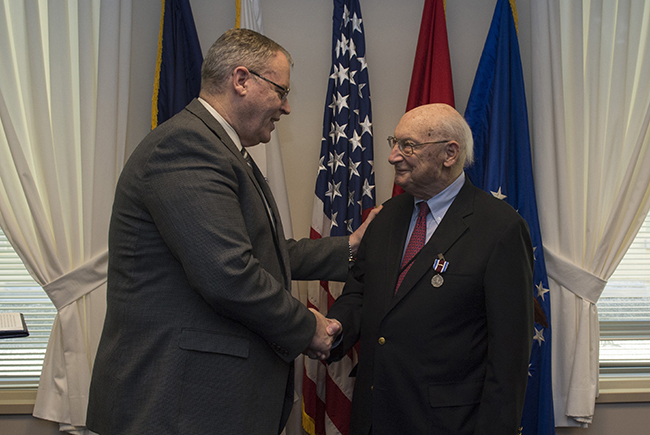
Then-Deputy Defense Secretary Bob Work hosts a farewell ceremony for Andrew M. Marshall at the Pentagon, Jan. 5, 2015. Marshall, 93, worked his last day as director of the Defense Department's Office of Net Assessment, retiring after 42 years. DOD photo by MSgt. Adrian Cadiz.
Andrew Marshall, the Pentagon’s top strategist through eight presidential administrations, died March 25, at age 97.
Marshall, known to some as “Yoda” because of his age and strategic wisdom, was, from 1973-2015, director of the Office of Net Assessment; an organization charged with long-term, deep thinking about US adversaries and the best ways to counter them.
Marshall proved prescient about a number of key strategic developments. He foresaw the Cold War bankrupting the former Soviet Union, causing its collapse, and he anticipated the rise of China as an economic and military powerhouse while that country’s streets were still populated with rickshaws.
Born in Michigan, Marshall was medically disqualified from military service and worked in a Detroit aircraft factory during WWII. Afterwards, he earned bachelor’s and master’s degrees in economics from the University of Chicago, but quit a doctoral program to work for the RAND Corp. in 1949. There he developed a theory of nations competing as corporations do, and emphasized asymmetric strategies wherein a competitor attacks his opponent’s weaknesses rather than strengths.
He joined the National Security Council in 1972 and, at the direction of then-Defense Secretary James Schlesinger, created the Office of Net Assessment in 1973, under the Nixon Administration. He was retained through the next seven presidential administrations because of his apolitical insight and mentorship of strategic thinkers in all the military services. His proteges include former Defense Secretaries Donald Rumsfeld and Dick Cheney.
While his emphasis on strategic competition caused Marshall to downplay or miss the threat posed by terrorism and cyber warfare, his thinking formed the basis of the George W. Bush Administration’s restructure of the US military into a lighter and more agile force.
Marshall’s infrequent reports were so closely held that their readership rarely exceeded a dozen individuals. Copies were not allowed. These reports identified “capability gaps,” or vulnerabilities that a smart adversary could exploit to neutralize US strengths, and recommended actions to close those gaps.
His last major study, written in 2009 in concert with then-Gen. James Mattis, who later beca,e Defense Secretary, pushed for renewal and expansion of US strategic capabilities, such as bombers, and greater realism in US wargames.
In 2012, Chinese Gen. Chen Zhou noted Marshall’s ideas as highly influential in shaping the modernization of the People’s Liberation Army.
James Baker took over the Office of Net Assessment in 2015, when Marshall retired, at the age of 93.
That year, Washington defense analysts Andrew Krepinevich and Andrew Watts published a book about Marshall, “The Last Warrior: Andrew Marshall and the Shaping of Modern American Defense Strategy.”
House Armed Services Committee ranking member Mac Thornberry (R-Texas) announced Marshall’s death during a hearing, saying he could think of few people “who have had a bigger impact on focusing our defense efforts [and] our national security. … He made such a difference.”